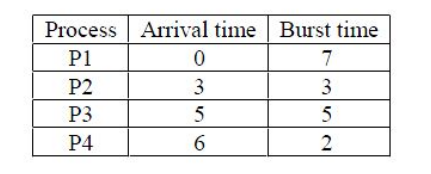Time Left - 07:00 mins
GATE CS 2018 - Operating System Daily Quiz- 2 (CPU Scheduling)
Attempt now to get your rank among 307 students!
Question 1
Consider an arbitrary set of CPU-bound processes with unequal CPU burst lengths submitted at the same time to a computer system. Which one of the following process scheduling algorithms would minimize the average waiting time in the ready queue?
Question 2
Consider the following CPU processes with arrival times (in milliseconds) and length of CPU bursts (in milliseconds) as given below:
If the pre-emptive shortest remaining time first scheduling algorithm is used to schedule the processes, then the average waiting time across all processes is _______ milliseconds.
Question 3
Consider the set of processes with arrival time (in milliseconds). CPU burst time (in milliseconds), and priority (0 is the highest priority) shown below. None of the processes have I/O burst time.

The average waiting time (in milliseconds) of all the processes using preemptive priority scheduling algorithm is ____.

The average waiting time (in milliseconds) of all the processes using preemptive priority scheduling algorithm is ____.
Question 4
Consider the 3 processes, P1, P2 and P3 shown in the table: 
The completion order of the 3 processes under the policies FCFS and RR2 (round robin scheduling with CPU quantum of 2 time units) are
Question 5
Consider three processes, all arriving at time zero, with total execution time of 10, 20 and 30 units, respectively. Each process spends the first 20% of execution time doing I/O, the next 70% of time doing computation, and the last 10% of time doing I/O again. The operating system uses a shortest remaining compute time first scheduling algorithm and schedules a new process either when the running process gets blocked on I/O or when the running process finishes its compute burst. Assume that all I/O operations can be overlapped as much as possible. For what percentage of time does the CPU remain idle?
- 307 attempts
- 2 upvotes
- 6 comments
Tags :
GATE & PSU CSGeneralApr 8GATE & PSU CS


